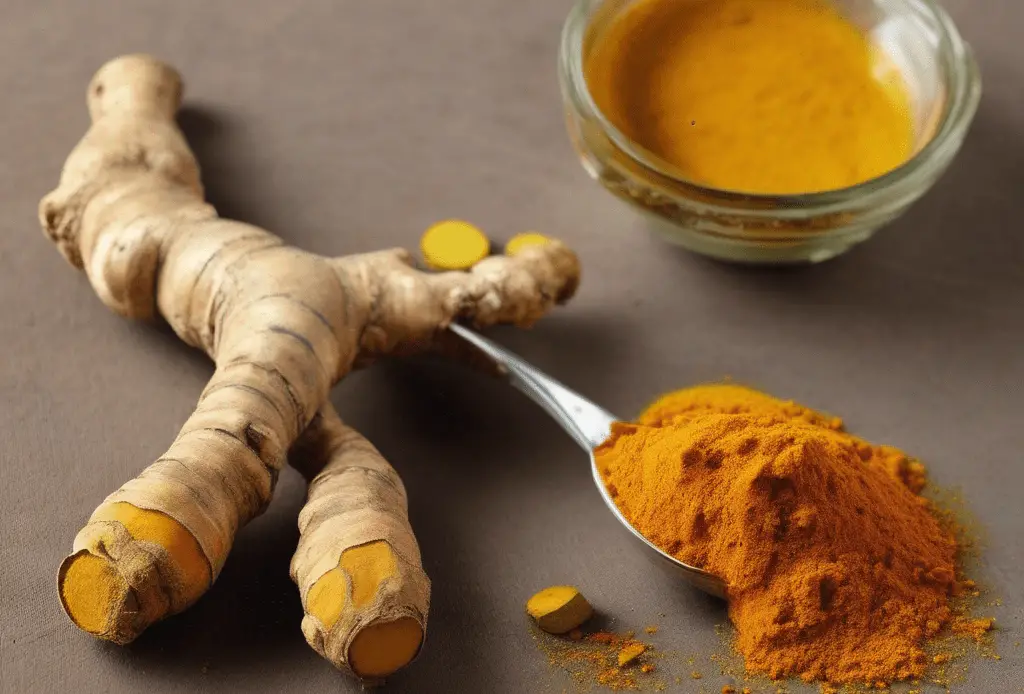This humble ingredient, commonly used in culinary traditions across the globe, particularly in Indian cuisine, has been cherished for centuries not only for its flavor but also for its medicinal properties.
So, what’s the big deal with turmeric?
What is Turmeric?
Why is Turmeric so popular? And, most importantly, what is Turmeric good for?
Before I answer all your questions, let us take a step back and look at the history of turmeric, how it was used in ancient times and its cultural significance.
Cultural and Historical Significance
For centuries, turmeric has played a central role in both culinary delights and traditional medicinal practices across various cultures. Its rich heritage spans through ancient healing systems such as Ayurveda and traditional Chinese medicine, where it holds esteemed reverence for its remarkable medicinal attributes. Turmeric has been a cornerstone of Ayurvedic medicine, a holistic healing system that originated in ancient India over 5,000 years ago. In Ayurveda, turmeric is valued for its therapeutic properties and is used to treat a wide range of ailments, including digestive issues, respiratory problems, skin conditions, and joint pain.
Beyond Ayurveda, turmeric features prominently in traditional medicine systems across Asia, including traditional Chinese medicine and traditional Indonesian medicine. Its use as a healing herb spans diverse cultures and is deeply ingrained in folk medicine practices aimed at promoting health and longevity. Overall, turmeric’s cultural and historical significance is multifaceted, encompassing its role in medicine, cuisine, religious rituals, trade, and folklore.
Furthermore, in this blog post I will share numerous health benefits that can be derived from turmeric such as improved memory, lessen pain, fight free radicals, lower risk of heart disease, help fight depression, help prevent cancer, Alzheimer’s disease, arthritis, keeping gut inflammation such as ulcerative colitis in remission and hold off aging. But first;
What Is Turmeric?
Turmeric also known as curcuma longa is a flowering plant in the ginger family, renowned for lending its distinctive yellow hue to curry, has been a staple in Indian cuisine and traditional medicine for millennia. Studies have revealed that turmeric harbors compounds known for their medicinal attributes, termed curcuminoids. Among these, curcumin stands out as the primary active component within turmeric.
What Is Curcumin?
Curcumin is a bioactive compound found in turmeric, responsible for its bright yellow color and many of its health benefits. It belongs to a group of compounds called curcuminoids, which are natural antioxidants. Curcumin has garnered significant attention due to its potent anti-inflammatory, antioxidant, antimicrobial, and potential anticancer properties. It is widely studied for its potential therapeutic effects and is used in various forms, including supplements, extracts, and topical creams, for its health-promoting benefits. Now that we understand the significance of curcumin, let’s delve into the remarkable health benefits of turmeric.
In this blog post I will share the amazing health benefits that can be derived from turmeric ranging from cognitive benefit to digestive benefits and so much more.
1. Curcumin has the potential to enhance brain-derived neurotrophic factor (BDNF)
Curcumin, the active compound found in turmeric, has garnered attention for its potential to enhance brain health by boosting brain-derived neurotrophic factor (BDNF). BDNF is a protein that plays a crucial role in supporting the growth, maintenance, and survival of neurons in the brain. Studies have shown that reduced levels of BDNF are associated with various neurological conditions, including depression, Alzheimer’s disease, and age-related cognitive decline. By increasing BDNF levels, curcumin may help promote neuroplasticity, the brain’s ability to adapt and form new connections, which is essential for learning, memory, and overall cognitive function
2. Turmeric may be useful in treating Alzheimer’s disease
7. Arthritis
Curcumin, exhibits promising potential in the treatment of arthritis. Its potent anti-inflammatory properties have been shown to reduce inflammation in the joints, a key contributor to arthritis symptoms such as pain and swelling. Additionally, curcumin acts as a powerful antioxidant, neutralizing oxidative stress and protecting joint tissues from damage and degradation associated with arthritis. By preserving joint integrity and modulating pain pathways, curcumin may provide relief from arthritis-related pain and discomfort while slowing the progression of the disease.
Furthermore, curcumin’s ability to inhibit enzymes that break down cartilage and stimulate the production of substances that support cartilage health suggests its potential in protecting and preserving joint function. While more research is needed to fully understand the mechanisms involved, studies have indicated that curcumin supplementation can lead to improvements in pain scores and physical function in individuals with arthritis. Curcumin holds promise as a natural remedy for managing arthritis symptoms and improving joint health, offering a potential alternative or complementary approach to conventional treatments.
8. Turmeric helps treat Depression
Turmeric, with its key component curcumin, is believed to offer some relief for depression. Curcumin seems to work by influencing brain chemicals that impact our mood, like serotonin and dopamine. It also fights inflammation in the brain, which can make depression symptoms worse. By protecting brain cells and encouraging the growth of new ones in areas linked to mood regulation, curcumin may help improve overall mental well-being. Additionally, it helps balance hormones that play a role in how we feel. While more research is needed to fully understand how turmeric can help with depression, some studies show promising results. However, it’s crucial to consult with a healthcare professional before trying turmeric or curcumin supplements, especially if you’re already taking other medications or have underlying health conditions.
9. Anxiety
Studies have unveiled that curcumin plays a role in elevating dopamine and serotonin levels in the brain, crucial neurotransmitters associated with feelings of happiness, alertness, and joy. Low levels of these chemicals are often linked to increased feelings of depression and anxiety, making the upsurge facilitated by curcumin significant in mitigating these symptoms. Furthermore, curcumin has demonstrated the ability to shield the brain from detrimental anxiety-inducing sulfates found in various foods. These compounds can heighten toxicity levels in the brain, impeding its function, but curcumin offers a protective mechanism against them.
The mounting evidence supporting curcumin’s effectiveness in alleviating anxiety is compelling. In some studies, turmeric curcumin has even been suggested to rival the efficacy of conventional antidepressants like Prozac. The accessibility of curcumin through daily ingestion underscores its potential as a natural remedy for anxiety, offering hope for those seeking alternatives to harsh pharmaceuticals.
10. Curcumin treats eye conditions
Studies have suggested that curcumin’s antioxidant properties could help protect against oxidative stress, which plays a role in the development and progression of AMD. Additionally, curcumin’s anti-inflammatory effects may help reduce inflammation in the retina, potentially slowing down the degenerative process.
Similarly, curcumin has been explored for its potential in managing other degenerative eye conditions, such as cataracts and glaucoma. Cataracts develop when proteins in the eye lens clump together, leading to cloudiness and impaired vision. Curcumin’s antioxidant properties may help prevent the formation of these protein clumps and protect against lens damage. In the case of glaucoma, curcumin’s ability to reduce intraocular pressure and inflammation may offer benefits in managing the condition and preserving vision.
Best Turmeric Supplements
Determining the “best” turmeric supplement can depend on individual needs, preferences, and health considerations. However, some factors to consider when selecting a turmeric supplement include:
- Curcumin Content: Look for supplements with a high concentration of curcumin, the active compound in turmeric responsible for its health benefits. Since curcumin is not easily absorbed by the body, some supplements include ingredients like black pepper extract (piperine) to enhance absorption.
- Quality and Purity: Choose supplements from reputable brands that undergo rigorous testing for quality, purity, and potency. Look for certifications such as Good Manufacturing Practices (GMP) and third-party testing to ensure product safety and efficacy.
- Bioavailability: Curcumin has poor bioavailability on its own, meaning it is not well-absorbed by the body. Consider supplements that use specialized formulations or technologies (such as liposomal delivery or nanoparticle technology) to enhance curcumin absorption and bioavailability.
- Additional Ingredients: Some turmeric supplements may contain additional ingredients, such as other antioxidants or anti-inflammatory compounds, to enhance their health benefits. Consider whether these additional ingredients align with your health goals and preferences.
- Formulation: Turmeric supplements are available in various forms, including capsules, tablets, powders, and liquid extracts. Choose a formulation that is convenient and easy for you to incorporate into your daily routine.
- Cost and Value: Compare prices and consider the overall value of the supplement based on factors such as curcumin content, quality, and additional ingredients.
- THORNE Curcumin Phytosome 1000 mg
- NOW Turmeric Curcumin
- Garden of Life Extra Strength Turmeric
- Garden of Life Extra Strength Turmeric
- Nordic Naturals Curcumin Gummies
- Terry Naturally CuraMed 750 mg Curcumin Complex
- Kirkland Signature Turmeric 1000 mg
Frequently Asked Questions
What is turmeric good for?
Turmeric is advocated as a dietary supplement for a range of health conditions, encompassing arthritis, digestive issues, respiratory infections, allergies, liver ailments, depression, and numerous other ailments.
Is it OK to take turmeric everyday?
Turmeric supplements containing up to 8 grams of curcumin daily appear safe for up to 2 months, while consuming up to 3 grams of turmeric daily is deemed safe for up to 3 months. Serious side effects from turmeric are rare.
What symptoms does turmeric treat?
Turmeric treats issues related to digestion and liver health, skin conditions, and aid wound healing. Additionally, curcumin, a key component of turmeric, exhibits potent antioxidant properties.
Who should not take turmeric?
Individuals who should avoid turmeric encompass those experiencing gallbladder issues, bleeding disorders, diabetes, gastroesophageal reflux disease (GERD), infertility, iron deficiency, liver ailments, hormone-sensitive conditions, and arrhythmia. Pregnant women and individuals preparing for surgery are advised against using turmeric.
Can you take turmeric if you take blood pressure medicine?
Like many other medications, it’s crucial to discuss with your doctor the use of blood pressure medication in conjunction with plant extracts, such as turmeric extract. Turmeric may interact unfavorably with certain medications, including those for blood pressure.









